October is National Bullying Prevention Month
By Ali Robidoux, MASCA Board Chair
As Board Chair of the Massachusetts School Counselors Association (MASCA), I am proud to stand with school counselors across the Commonwealth this October as we recognize National Bullying Prevention Month. This is an important time to elevate our shared commitment to creating schools where every student feels safe, respected, and included. Bullying is not simply a childhood challenge. It can harm a student’s sense of belonging, impact academic success, and leave lasting scars well into adulthood. Even those who witness bullying can feel anxious, disconnected, or powerless. As leaders in prevention and student support, school counselors are uniquely positioned to guide schools in building positive, inclusive cultures where kindness is celebrated and harmful behaviors are addressed directly.
A strong Tier 1 approach is the foundation of this work. When we design initiatives that involve the entire school community, we reinforce norms of respect and empower students to take active roles in shaping their environments. Counselors play a central role in this by designing, leading, and modeling prevention efforts that benefit all students.
Here are three counselor-led Tier 1 initiatives that can be adapted across levels:
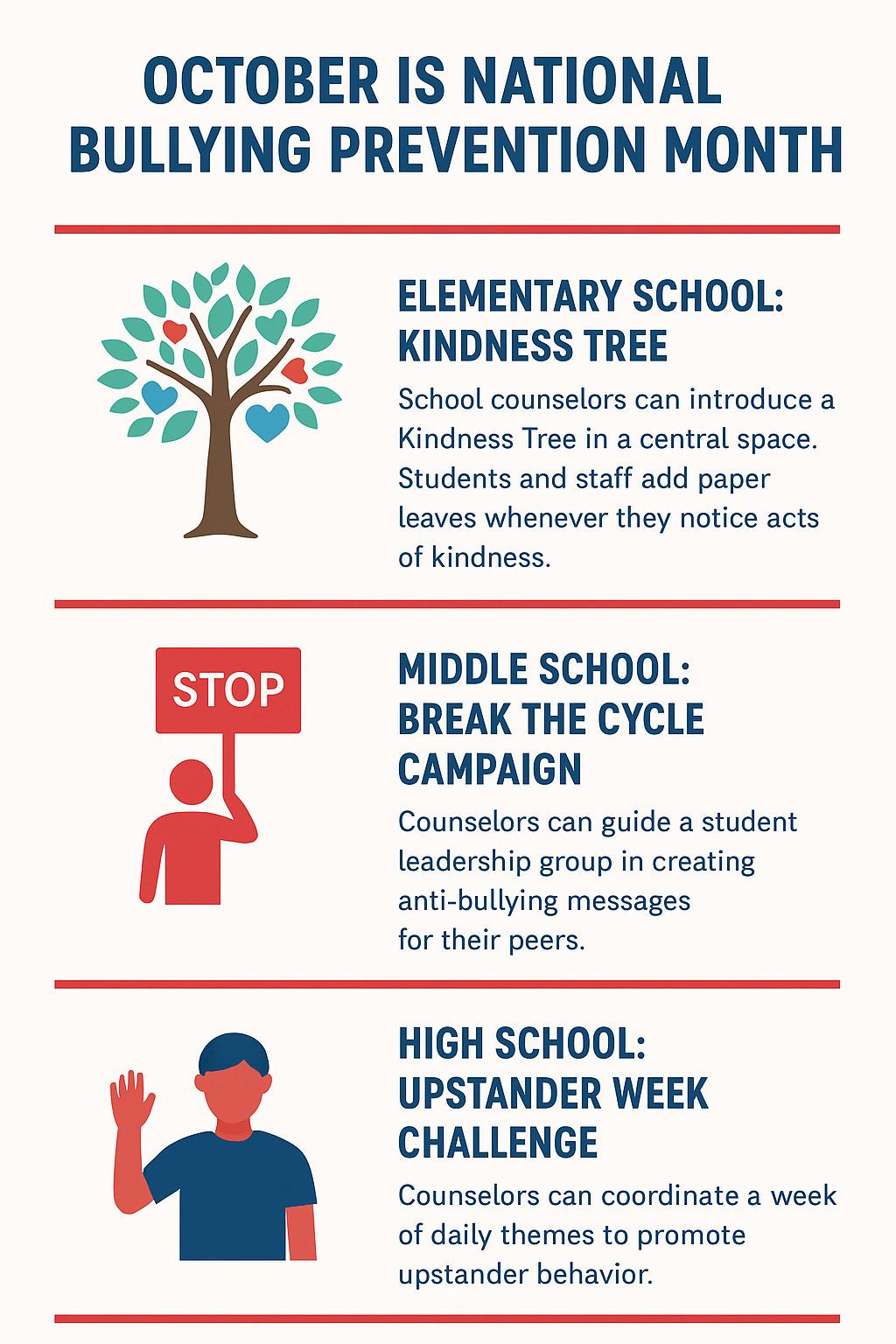
Elementary School: Kindness Tree
School counselors can introduce a Kindness Tree in a central space. Students and staff add paper leaves whenever they notice acts of kindness. Through classroom lessons, counselors connect the activity to empathy and friendship skills, making kindness visible and celebrated across the school.
(continued next page)
Bullying Prevention
(continued from previous page)
Middle School: Break the Cycle Campaign
Counselors can guide a student leadership group in creating anti-bullying messages for their peers. With our support, students design posters, videos, or school announcements that highlight respect and inclusion. Counselors can help launch the campaign with a student-led assembly featuring skits or spoken word performances, reinforcing the message that students themselves can break the cycle.
High School: Upstander Week Challenge
Counselors can coordinate a week of daily themes to promote upstander behavior. For example, “Check-In
Monday” encourages students to reach out to a peer, while “Take Action Tuesday” reinforces safe ways to intervene. Counselors highlight examples of student leadership throughout the week, culminating in recognition for those who take a stand.
At MASCA, we know that bullying prevention is not a one-month initiative. It is an ongoing commitment that requires strong leadership and collaboration. October provides us with the opportunity to spotlight the work school counselors are already doing and to recommit to leading prevention efforts with intention and creativity.
Together, we can ensure that bullying prevention remains a priority and that all of our students thrive.


Don’t Miss MASCA’s Spring Conference! For more information or to register, go to https://ncyionline.org/conferences/mascac/.
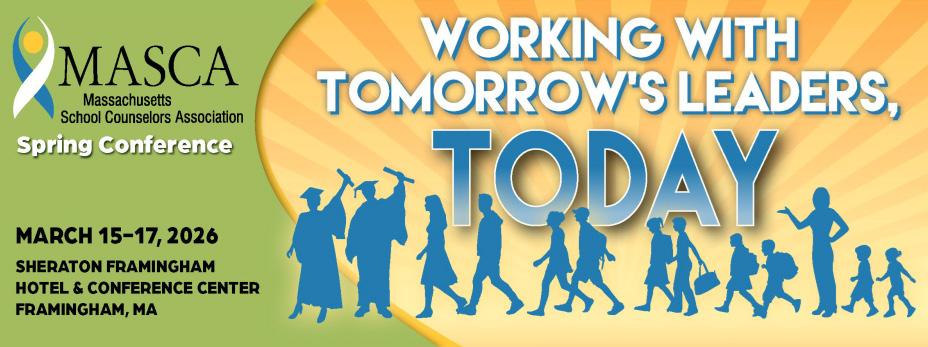
Director’s Message
District Trainings
By Bob Bardwell, MASCA Executive Director

Now that the school year is well underway, many districts have already started their monthly or periodic half or full professional development days, times in which students are not in the school buildings so school staff can focus on enhancing their knowledge and skills.
Fortunately for MASCA, this year we have been able to increase our services by providing in-person or virtual trainings for school counselors and/or other schoolbased staff (i.e.: BCBAs, school psychologists, school social workers). The reason that MASCA is now able to offer these services is that in my full-time role I have the time to both prepare and deliver a variety of trainings for interested districts.
Since the end of August, I have conducted seven trainings and have 16 more confirmed through April with additional districts still in the initial discussion stage. Each week I get more inquiries. The problem now is they seem to want me on the same day, but I am doing my best to accommodate everyone.
Why is this a big deal and a worthy topic of my column this month? Well, in addition to providing MASCA with additional income, it allows MASCA to establish itself as the premiere resource for school counselor professional development in the Commonwealth. Being visible in schools and ensuring that our school counselors have the tools, information and resources needed to be the best they can be is a top priority. We want district administrators and others who coordinate professional development to automatically think of MASCA when looking to fulfill their PD needs.
Being able to offer these trainings not only help me to stay current with what is happening in the field, but also allow me to be in community with and connected to our members and non-members alike. As a membership organization, it is important that members have the opportunity to be connected. For those who do not attend our conference, professional development opportunities or read our communications, this training might be the only way in which they connect with MASCA. I also happen to really like to do these types of trainings. I have presented at over 80 national, regional and state conferences and in 16 states addressing a variety of school counseling topics. This has to be one of my favorite parts of my job.
So what type of trainings can districts receive? The easiest answer is whatever they need. That being said, below are some of the more popular topics. The links take you to view more detailed descriptions of each topic, including learning objectives.
• School Counselors Using Data to Improve Student Achievement and School Climate
• Mapping Your School Counseling Curriculum: Yes it Can Be Done
• How to Develop a Comprehensive School Counseling Program That Will Make A Difference For Your Students
• Administrators and Counselors Working Together to Impact School Climate and Culture
• Got Attendance Issues? Leveraging School Counselors to Improve Attendance Rates
Trainings can be for an hour or for six hours or anything in between. Some districts are looking for multiple training dates (and topics) spread out over the year. Others are only looking for a one-time session. The fee for a full day (6 hours) is $1500 and a half day (3 hours) is $750. Other time variations can be arranged and thus the fee is adjusted accordingly. The fee includes all travel expenses and supplies. While this may seem like a lot of money, especially in the days of budget cuts and freezes, most other trainers charge much more. ASCA, for example, charges $4000 per day.
If you and/or your colleagues are interested in learning more about any of these training opportunities, please reach out to me so we can discuss. I would love to say that in the next couple of years MASCA has trained in all districts across the Commonwealth. That would be some accomplishment.
Here’s to an outstanding October and may your professional development needs be fully met.

The Dilemma of Ethics
By Deborah Hempel
Ethics… Let’s face it - in the daily routine of a busy school counselor, we don’t have time to pause for lengthy discussions about ethics. We need to take care of the task (or on most days, the 15 tasks) in front of us so we can move on to putting out the next fire that lands in our office. We tend to avoid talking about ethics until something significant happens, and we suddenly realize that we are wading through the muck of a very sticky situation.
Maybe we avoid ethics discussions because we perceive them as boring or too philosophical for our everyday lives in our school counseling world. We have a vague recollection of a course we took in graduate school where we talked about ethics, but it felt abstract because it was before we were working full-time in a school. It was hard to “practice” because we didn’t yet have concrete examples where we had to personally apply ethical standards to our decision making.
Ethics are not a clear black and white set of rules to follow. After all, they are tied to belief systems, values, and culture. Ethics are not a mathematical equation with one solution. Talking about ethics might even open up a conflict that we didn’t know was there, and it takes time to have a discussion about the ethics of a situation— time that we definitely don’t have. No wonder many of us find ourselves steering clear of ethics conversations.
In our counseling roles, we prioritize the well-being of our students and strive to act in their best interest. Working with minors in a school setting has the potential to put us into situations where supporting students collides with best practices or even laws and legal interpretations. What happens when a student’s best interest is contrary to a school rule, a law, or what we know is the parent’s wish for the student? What happens when our own belief systems or biases get in the way? That’s where ethics can be our guide.
If you haven’t looked at the ASCA Ethical Standards document lately, I encourage you to review it. As school counselors, it is our responsibility to uphold these ethical standards. They should guide our decision-making in our professional capacity.
Additionally, despite our lack of time or mental bandwidth, talking about ethics actually helps us approach and handle complex situations with more confidence and professionalism. And besides, the more you talk about ethics, the more interesting it becomes! So, when you find yourself in a sticky situation, circle back to the ASCA Ethical Standards to remind you what your professional priorities are.
If you want to learn more about the wonderfully complex world of ethics, consider joining the Ethics Committee’s symposium this year. Last year we facilitated 10 one-hour sessions throughout the school year. Each time we met, we covered a different topic with a lens for ethics. We are excited to be planning a second symposium for this year. If you weren’t able to join us last year, we hope you will consider it this year. If you attended last year, we hope you will join us again as we will cover different topics and will be incorporating case studies and small group discussions. Watch for more information coming soon. Hope to see you there!

WON’T YOU JOIN US?
The Top 10 Benefits of MASCA Membership
• Networking Opportunities
• Professional Development Opportunities / PDP’s
• Annual Professional Conference
• Members-only Special Interest Groups (SIGs)
• Members-Only Content on Website
• Counselor’s Directory online through Website
• Access to MASCA’s mentoring program
• The Counselor’s Notebook
• MA Model - a Comprehensive School Counseling Program
• Advocacy and Legislative Action Go to https://masca.wildapricot.org/join-us
New MASCA Members:
Madyson Abrams
Barbara Aliceea
Jenna Anderson
Deana Attolino
Jordan Boschetto
Michael Bowler
Talia Caloggero
Jennifer Chace
Caroline DeMaria
Reese Deshaies
Erin Doolin
Julie Duffin
Tatiana Estrada
Peter Ferraro
Deirdre Finn
Anuj Gautam
Hilary Gordon
Sophia “Adrie” Greabe
Megan Greene
Anna Griffiths
Jorja Hammill
Emily Harris
Jill Herron
Kylee Hodnett
Torrie Hodovanec
Erin Jeffrey
Audrey Jepson
Jaymie Johnson
Ryan Julian
Sinead Kerin
Jordan Lane
Chandler LaValle
Kaitlyn McGee
Ann Muirhead
Melissa Peduto
Keren Romero
Emily Rudy
Jennifer Rulf
Anne Scully
Leyton Sheppard
Sydney Smith
Lauren Stearns
Kerry Tagman
Kirsten-Gail Vanhorne
Lily Wildrick
Jacqueline Wilson
If you know or happen to meet any of our new members, please extend a very warm welcome!

Where’s Ollie?
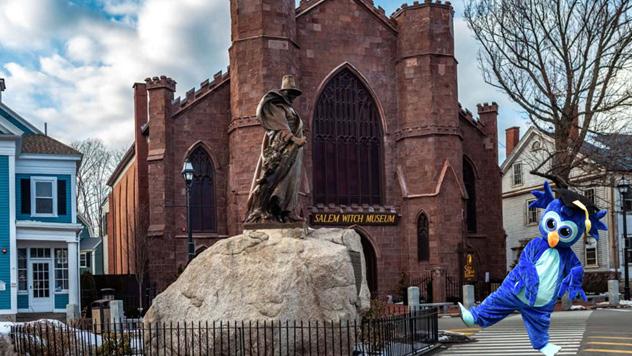
The correct answer to last month’s Where’s Ollie? challenge is: Tanglewood. Nestled in the Berkshires, Tanglewood in Lenox, MA is a magical spot where world-class music meets stunning scenery. Home to the Boston Symphony Orchestra’s summer season, it’s the perfect blend of culture and relaxation. If you haven’t visited already, pack a picnic, spread out on the lawn, and enjoy unforgettable performances under the stars!
Congratulations to Amanda Berg (Granby Jr./Sr. High School), winner of the September Where’s Ollie? contest. Amanda won a MASCA membership or renewal of membership! Honorable mention for Charlsey Penney (Worcester Public Schools), Mike
Penney (Abby Kelley Foster Charter), Stephanie Bates (Norton High School), Robin Wildman (Masconomet RHS), and Jean Atwater-Williams for getting the correct answer. Great job!
Where is Ollie this month?
Submit your guess and win a $10 Amazon gift card. Submissions are due 10/15/25. One entry per person. Send us your guess using this form or scanning the QR code.

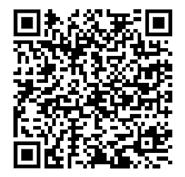
ADHD
New School Counselor Success
By Christine Weissman, MASCA Affiliate Liaiason and School Adjustment Counselor, Athol Community Elementary School
I feel so lucky to have recently found my dream job as an elementary school counselor. Although this is my first year in elementary school, I have four years of experience as a guidance counselor for middle and high school. So, with this move I feel like a newbie all over again. I’d like to share my past strategies for success in navigating my first year with you.
My first steps involved learning the school environment, establishing connections, and building a support system. In looking at the school environment, I spent time observing how the school operates, including daily schedules and routines. I took a look at the school’s calendar, district plans and procedures, student handbook, and mission statement. It’s fun to embrace the school’s colors, mascot, and team spirit, and I enjoyed shopping in the online store for school and sports merch. This helped me to feel included as a member of the school community and culture.
I made an effort to meet and build relationships with students, teachers, staff, administrators, and parents. Establishing these connections helped me to foster trust in my school community, and helped me to create my network of mentors and collaborators. I attended as many school events as I could, and was visible in the hallways and at recess, lunch times, and for bus arrivals and departures. Being visible and available created opportunities for students and staff to get to know me better.
In the first year of a position, schools should provide a mentor. Veteran counselors or other school counseling personnel can be extremely helpful your first year. This year I am learning the ins and outs of writing social emotional goals and objectives for IEPs, including the online platform. My mentors have also helped with my preparation for my educator evaluations including goals and professional development.
This year I am excited to be part of the Massachusetts School Counselors Association’s (MASCA) Mentoring Program. The program offers support to new school counselors or current school counselors moving to a different grade level of service. MASCA supports the mentor/mentee relationship with a diverse, trained cohort of mentors. I have been matched with an elementary school adjustment counselor with fourteen years of experience. Our partnership is off to a great start, and I know she will be providing me with support and advice as I navigate my new position.
Mentors and colleagues were crucial to me that first year, and I am continuing to reach out to those
in the field I can look to for support, encouragement, and network-
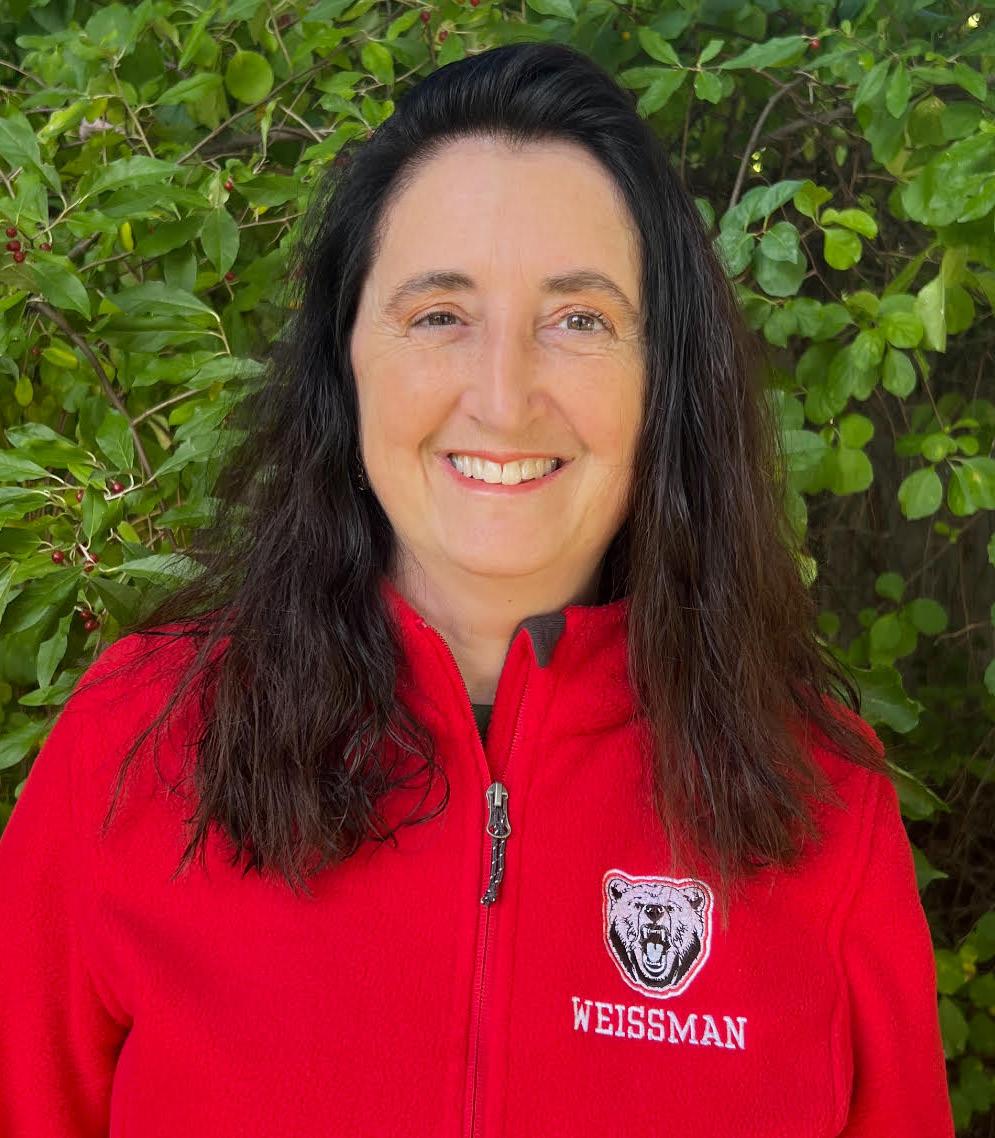
the Central Massachusetts Association of School Counselors (CMASC) formerly known as the Worcester County Personnel and Guidance Association (WCPGA). This group has been around since 1935, which predates MASCA that was founded in 1961! I’m pretty sure it is the oldest professional Guidance Association Affiliate. My time in the group has been amazing. Not only do I get the chance to network with my counseling colleagues, but I can learn about colleges who present and generously sponsor our events, earn PDPs on relevant topics to better serve my students, staff, and myself, and I can grow as a professional and have fun at the same time. The group offers on average five events per year, and for a small membership fee, all events are covered. This group has helped me feel stronger as a counselor, and since the PD is specific to counseling, it has been a great resource for information and connecting with outside agencies. I recommend taking the time to go to the MASCA website and find your closest affiliate and see what they offer in your area.
In addition to learning about best practices from others, taking a deep dive into everything counseling in media has helped me in my first year. This includes books, websites, and podcasts. The American School Counselor Association (ASCA) offers a wealth of information for new counselors. They have a library of templates and tools for us, and I found a New School Counselor 90 Day Entry Plan that I am using now. Of course, MASCA has many resources on their website including this fabulous newsletter, special interest groups, and committees to explore. My go to podcasts includes Counselor Accents, School for School Counselors, and School Counseling Simplified. The books that helped me the most includes Growing Your Program for School Counselors (written by the Counselor Accent hosts), School Counseling Chronicles, and Motivational Interviewing for School Counselors.
(continued on page 9) ing. I joined my local affiliate liaison. MASCA has fourteen affiliates across the state, and each can be found on their website. I joined
MASCA Professional Recognition Committee (PRC) announces MASCA Awards Season with a new timeline and a new award!
Submitted by: Tama Lang & Dina Sibilia, PRC Co-Chairs
Click here: NOMINATION FORM
THE NEW TIMELINE
The PRC is pleased to announce a new timeline for the MASCA Award Season. Beginning October 1st, we will begin accepting nominations for MASCA Awards. The nominations will close on October 31st.
Nominees in all categories will be notified by email provided by their nominator. You may also self-nominate. If you are nominated, you will be asked to accept your nomination and send a photo to be presented at the Virtual Gala via zoom on February 5, 2026 at 7:00 PM. Winners will be notified by late January.
Nominees for the School Counselor of the Year and the Excellence (SCOY) in School Counseling Program (ESCPA) will be asked to complete and submit applications about themselves and/or their programs. Nominees for SCOY or ESCPA will be provided with ample time to complete the application.
THE NEW AWARD
The MASCA Diversity Fellows and the Professional Recognition Committee are pleased to announce the reintroduction of The MASCA Award for Social Advocacy. This award honors and recognizes a member of the school counseling community who exemplifies unwavering commitment to human rights, social justice, and inclusive practices. The recipient demonstrates leadership in advancing Diversity, Equity, Inclusion, and Accessibility (IDEA) in their school community, fostering a safe and affirming environment for all students, particularly those from historically marginalized backgrounds. Through advocacy, empathy, and transformative action, they have demonstrated ways of how they have empowered their students or peers in the areas of human rights, social justice, and IDEA.
THE AWARDS, WHO TO NOMINATE AND WHY
Each year, we recognize our fellow counselors and educators who have made an impact in the field of school counseling. We encourage you to nominate your colleagues in the following areas.
School Counselor of the Year (SCOY): A current MASCA member (may join MASCA any
time during the process) and licensed counselor during the current school year in an elementary, middle, or high school, who has made outstanding contributions to their school and is running a top-notch, comprehensive school counseling program.The school counselor of the year has been working in the field for more than five years. The nominee can be a School Counselor or a School Adjustment Counselor. The following criteria are reviewed:
1) Has made an impact on students’ academic, social emotional, and behavioral well-being through a variety of programs, interventions, and school counseling best practices.
2) Has positively contributed to their school community through collaboration.
3) Demonstrates an understanding of both the American School Counseling Association (ASCA) and the Massachusetts School Counseling Association programming and initiatives, such as MA Model 3.0 and ASCA National Model.
4) Serves as an advocate for students and demonstrates professional advocacy, such as influencing school policy or participating in local or state organizations.
5) Demonstrates leadership skills within the school, district, or community.
6) Makes data driven decisions to inform best school counseling practices.
7) Establishes community engagement by building strong relationships with stakeholders.
8) Has bettered their school and/or district by executing a comprehensive school counseling program.
Once nominations close, SCOY nominees will be asked to submit additional information by December 1, 2025 including an essay, resume, and letters of recommendation. If selected as the MASCA 2026 SCOY, the award recipient will be required to join ASCA in order to participate in the 2027 ASCA School Counselor of the Year application program.
(continued next page)
Awards
Rising Star
(continued from previous page)
The MASCA Rising Star is awarded to a school counselor who has been working in the field for less than five years. They must be a member of MASCA (can join anytime during this process). Nominators should consider the following when nominating for this award.
1) Has made outstanding and innovative contributions to the school community and/or the counseling profession, actively engaging in professional development and leadership opportunities.
2) Demonstrates a positive rapport with colleagues, students and parents.
3) Demonstrates data informed practices and an understanding of both ASCA and MASCA initiatives.
4) Has made your school, district or program better.
Intern of the Year
Awarded to a school counseling intern who completed their practicum during the 2024-2025 school year. This nominee has taken leadership in their placement, connected with students and families, and is a contributing member of the counseling team. **May be nominated by anyone at their internship site, though we particularly welcome nominations from their internship site supervisor. MASCA membership is not required but encouraged.
Graduate Student of the Year
The MASCA Graduate student of the Year is different from the Intern of the year as the nominator is either professors or peers. The nominee is a graduate student in either a masters or doctoral level program in school counselor or counselor education who consistently demonstrates excellence in the classroom. This award nominee enhances the learning of their peers, demonstrates a robust understanding of the role of the school counselor, including as it relates to equity, and demonstrates academic excellence. The graduate student will demonstrate any or all of the following criteria:
1) Is taking on leadership roles in college, local or state organizations.
2) Showing promising research/publication.
3) Presentations at local PD, conferences etc.
Counselor Educator of the Year
The MASCA Counselor Educator of the Year is a Professor in a School Counseling program. The nominee is a current MASCA member and counselor educator teaching during the current academic year in a higher education setting, who has made outstanding contributions in teaching, research, and/or service and is making significant contributions to the school counseling field. Nominators should include the following in their nomination:
1) Has made an impact in the school counseling field through research, publication, programming, and professional development, OR has engaged in evidence-based practices and disseminated research-based lessons.
(continued page 10)
New Counselor
(continued from page 7)
Lastly, and most importantly, self-care has been crucial to surviving my first year. We all know in order to take care of others; we need to take care of ourselves first, and I have heard us described as “first responders.” I am a firm believer that selfcare is not selfish, and I am a huge proponent of mindfulness practices. Not only does prioritizing a personal mindfulness practice benefit us professionally and personally, resulting in better emotion management, deeper connections and improved self-regulation, this process produces better student outcomes. I learned to cultivate my own practices in order to be a better counselor for my students, and I am continually updating it based on my needs. Books that have helped me with nurturing my mindfulness practices includes Happy Teachers Change the World, The Way of Mindful Education: Cultivating Well-Being in Teachers and Students, Fully Present: The Science, Art, and Practice of Mindfulness, and anything by Jon Kabat-Zinn. I am currently reading Trauma-Stewardship: An Everyday Guide to Caring for Self While Caring for Others. I learned about this book at a recent presentation on Trauma Informed Peer Partnerships (TIPPS) through CMASC.
If mindfulness practices aren’t for you, anything you can do for your own self-care will be beneficial in helping you be there for your students and avoiding burnout. Please feel free to reach out if you have any questions about navigating your first year, or first time in a new position, and of course if you want to talk mindfulness!
You got this!

(continued from page 9)
2) Has promoted Inclusion, diversity, equity, and access.
3) Is a mentor and a leader both in and out of the classroom.
Administrator of the Year
The MASCA Administrator of the Year is for a building or district administrator (Assistant Principal, Dean of Students, Principal, Superintendent, etc) who is a champion of school counselors. The award is presented to an administrator who has made an outstanding and significant contribution to the counseling movement, developed and/or implemented an innovative program, or initiated unusual improvements of school counseling services in their area of responsibility. The administrator of the year is reviewed based on the following criteria:
1) An active supporter of the school counseling program through communication and collaboration.
2) Actively supports the development and growth of school counselors and programs.
3) A leader who recognizes the importance of a strong counseling program and is committed to the growth and potential of the school counseling program.
Leadership Award
Awarded to a current MASCA member and licensed counselor serving during the current school year in an elementary, middle, or high school who demonstrates leadership in the counseling profession at the local, state, or national level. Nominators should share the concrete impact of their nominee’s leadership role. Criteria will be reviewed based on the nominee’s impact on their school counseling program or profession at the local, state or national level.
The Special Award
The Special award, although not given every year, is granted to an individual who does not fit into any of the above categories, but has done something deserving of recognition. The award is presented to an individual who has made a contribution of unusual significance that substantially affects the school counseling profession. The contribution directly affects counselors, students, or a school program and the individual is not eligible for any other MASCA awards. If you believe that you have someone who fits into this category, please reach out to us with your story.
Excellence in School Counseling Program Award (ESCPA)
The ESCPA celebrates a school counseling department that has gone above and beyond in designing and delivering a comprehensive school counseling program. This recognition honors school counseling programs whose work exemplifies the highest standards in the field, aligning with the Massachusetts Model 3.0 and/or the ASCA National Model to support the success of all students.
Any member of the school community may nominate a school counseling program for this recognition. Nominators must include contact information for all members of the counseling team and provide a clear explanation of why the program is deserving of the award. The nomination should describe the program’s positive, measurable impact on students—such as improvements in academic achievement, attendance, or behavior.
This Award is for a school counseling PROGRAM which can be one school or a full district program. Each school will be evaluated based on the following criteria:
1) Vision and Mission Statement
2) Student outcome goal -academic, behavioral, or attendance (two of the three domains required), process and data.
3) MTSS model - Programmatic levels of intervention
4) Advocacy - dissemination of information to stakeholders
5) Additional points may be awarded for Advisory Council, tracking usage of time, hosting creative school events, and interventions and/or initiatives that are unique to the program
Schools that reach specific scoring criteria in each category will be awarded the ESCPA for a five year period.
All documentation should be submitted by December 1, 2025.
NOTE: It is possible that not every category will have an honoree.
If you have any questions regarding certain categories, timeline, nomination process, or have a general inquiry, please contact either PRC CoChair, Tama Lang at tlang@cpsge.org or Dina Sibilia at sibilia@wsps.org. The PRC is looking forward to reviewing all of the nominations.

Building Empathy through Peer to Peer Programming
by Courtney Royal, MASCA Emerging Leader Liaiason and School Counselor, Gloucester High School
October is Anti-Bullying Awareness Month, and as School Counselors it is also an important time to evaluate what programs are working for youth in creating a safe space for all students to learn and grow. When we think of anti-bullying and harassment protocol, we often take on a more reactionary perspective; supporting a student who has already been victimized, and grappling with how to educate and change behavior for the student who has been identified as the antagonist. Although disciplinary action does often come with bullying protocol, it is also essential to look at the social culture in which our students are living, and provide opportunities for students to practice empathy skills, perspective taking and appropriate conflict resolution skills when disagreements among peers arise. As we look to develop practices to target unwanted behavior, it is just as important to identify and support student connection and school culture as a whole. And who better to do this than our most valued and important factor in overall student connection? Our own students!
Peer to peer programs relies on our students to be the guides, and empowers them to use problem solving, conflict resolution skills and empathy to help similar aged students in their school community through social emotional or academic support (Inclusive Schools, 2025). It has been proven that effective peer to peer programming in schools raises school culture and connection more so than adult driven programs alone (Inclusive Schools, 2025). Seeing our students as protective factors to help with both academic and social emotional success drives this culture shift seen on campuses with effective peer to peer programs (Logsdon, et al., 2018). Through involvement in prevention activities, students are empowered to work alongside their school and community to cultivate a secure school environment and culture, especially with some of our most difficult cases like those involving bullying (ASCA, 2021).
Peer to peer programming can look different across schools and grade levels, and often times can be modified to meet the needs of your students when using evidence-based practices in conflict resolution, confidentiality, communication skills (Logsdon, et al., 2018). As School Counselors, we have the unique opportunity to not only help shift our school culture with the use of peer to peer programming in a very positive way, while also providing students with communication skills, conflict resolution skills, decision making skills, development of cultural competence, accepting others’ differences and recognizing early signs of distress/ violence among peers (ASCA, 2021).
Although this can sound like a grand addition to your School Counseling program, peer to peer programs can look as complex as the creation of a class designed to train peer mediators, or something as sim-
ple as having designated peer mentors assigned to a classroom during times of transition. For example, together with my former Co-Counselor at the Ellis School in Fremont, NH we designed a “Big Eagle, Little Eagle” model, training older students to serve as conflict mediators and mentors for younger students in their classrooms. “Linking peer to peer models has drastically changed the culture of our school in a big way. Students learn skills from peers in solving problems, and are better equipped to be upstanders when they see something that doesn’t feel right”, shares Melissa Simard, School Counselor. “Helping other students helps me feel like a better friend too” shares a 7th grader serving her school. When we think about the impact we have, and building a program designed for students to feel more connected and safe at school, and reduce bullying, we need to turn to our most valuable experts, our students!

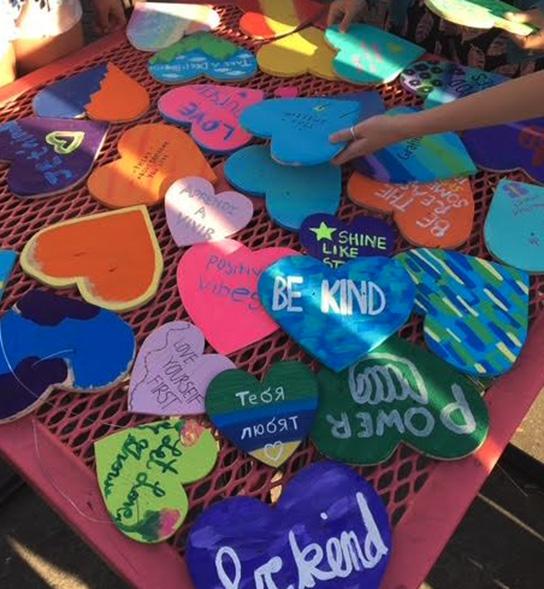
Peer Helpers Class, 2016
References:
Logsdon, P., Samudre, M., Kleinert, H., & University of Kentucky, H. D. I. (2018). A Qualitative Study of the Impact of Peer Networks and Peer Support Arrangements in Project Pilot Schools. Research Brief. Winter 2018. Human Development Institute.
DeVoogd, K., Lane-Garon, P., & Kralowec, C. (2016). Direct instruction and guided practice matter in conflict resolution and social-emotional learning. Conflict Resolution Quarterly, 33, 279-296. doi: 10.1002/crq.21156. Retrieved from: https://ssrn.com/abstract=2796734
ASCA Adaptation: https://www.schoolcounselor.org/ Standards-Positions/Position-Statements/ASCA-Position-Statements/The-School-Counselor-and-Peer-Support-Programs
https://inclusiveschools.org/resource/youve-got-a-friend/
Why are you a MASCA member?
Being involved in your local association helps support the development of the state you are involved in. I want to better all of us in Massachusetts
What makes you unique as a school counselor?
My relationship building
What inspires you about being a school counselor?
I like to meet students and speak to them where they are at. Students know when you are trustworthy and honest. Doing for students what was done by my counselor. I want to support and be a resource to all students’ success
What career would you be doing if you were not a school counselor?
Something in technology or IT
What is your favorite tool to use in your work as a school counselor?
Google drive and Google suite are most counselor’s best friend
What words do you live by?
Family always comes first and nobody plays to lose
Why is it important to you to be part of a community of school counselors?
I want to know I’ve made an impact in all aspects inside my building and in our field of work
How would you describe your job to a 5 year old?
I make sure students are happy and healthy in my office
How do you decompress/eliminate stress or refuel for the next day?
Family time and physical activty
What brings you joy?
Family and football
Share an example of something that you learned from one of your students.
I learn a great deal from my students. The most impactful has been the knowledge of cultures from my students
What is your favorite dessert?
Chocolate Peanut butter Cake
What is your guilty pleasure? The show Scrubs
What superpower do you wish you had?
Super speed
What is your typical breakfast?
Protein shake and an apple
What is one thing that you are really good at?
Karaoke
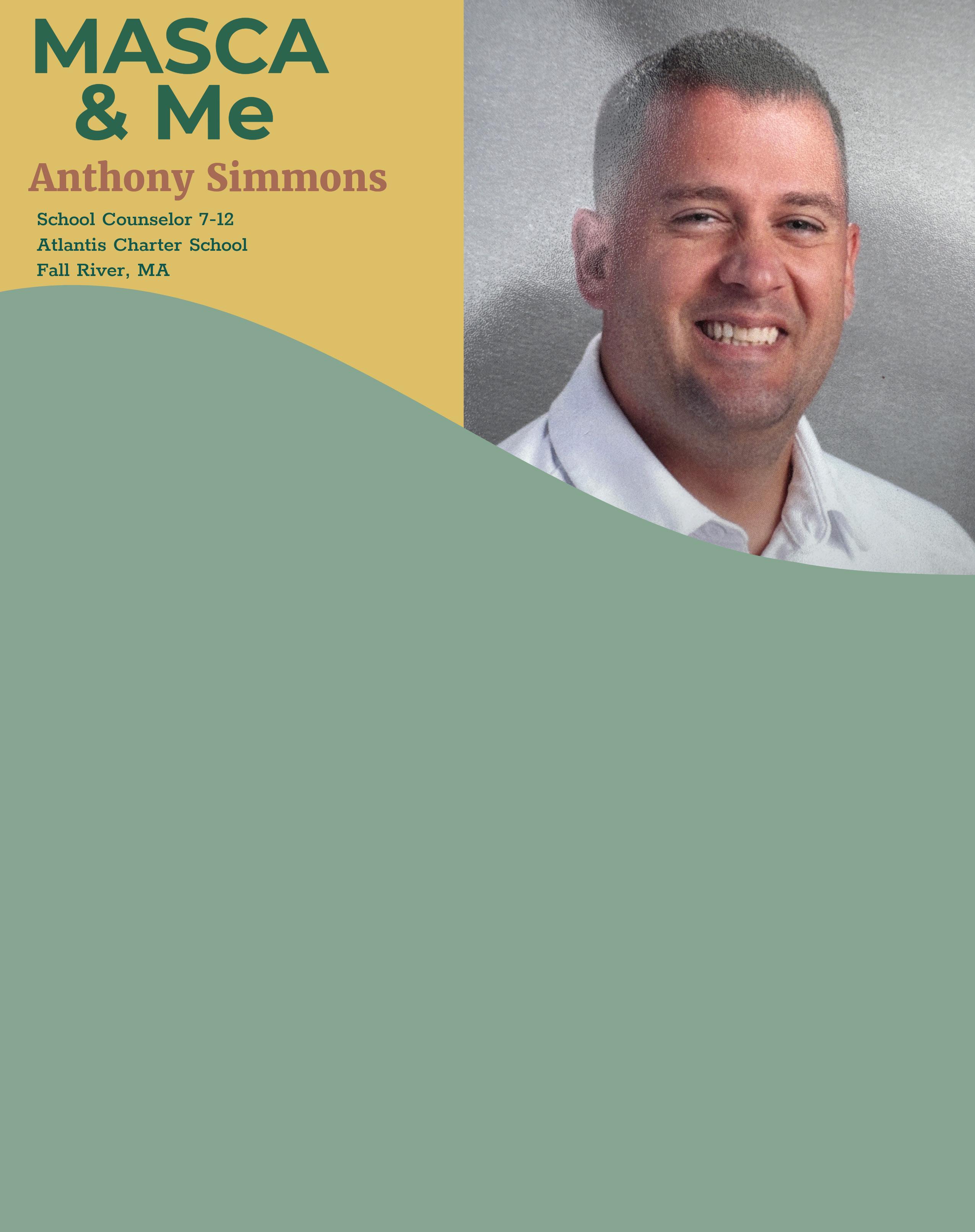
What is your coffee order? I don’t drink coffee
What could you talk about for 30 minutes with no notes?
Football
What is your favorite smell and why? Lavender, it’s relaxing
Do you have any hidden talents?
Singing
What TV show are you currently binge watching?
House and Scrubs for the 10th time
What book are you currently reading? What is the author?
I’m not much of a read for pleasure person
What is something you think people don’t know about you?
That I’m a twin
What is your favorite song or artist? Die a Happy Man by Thomas Rhett
Spicing up the Norm: a Neurodiverse Perspective
By Amanda Berg, MEd. and MASCA Diversity Fellow
A friend of mine often refers to one of her kiddos as “neurospicy”, I couldn’t help but chuckle the first time I heard her say it. I said that’s how I would describe myself! In an article entitled “What is neurodiversity” Harvard Health states,“Neurodiversity is the recognition that variations in human brain function and behavior, including those associated with conditions like autism and ADHD, are part of natural diversity rather than deficits, and should be respected and accommodated as such.” (Harvard Health, 2021). The term “neurospicy” though not scientifically defined, accurately describes my functions of behavior as it relates to my personality. My own students have become aware of their own behaviors and unique learning styles which has led me to think about my own childhood. I can certainly say, I was unaware of my neurodivergent behavior, I was more concerned about television or what my friends and I were
I recently asked my friend’s seven year old son how he described his neurodivergence, “His brain feels like too many apps are open on his iPad and he cannot sleep”. He is aware there are a lot of things happening and that neurodivergence can interfere with sleep. Did I mention he is 7?
We have so many tools as counselors to help our students learn about their own learning styles and behaviors. Here are some tools you can utilize to help make a meaningful impact on your students learning:
● Movement breaks
● Headphones to block the noise/play music
● Sensory/tactile tools/fidgets
● Preteach
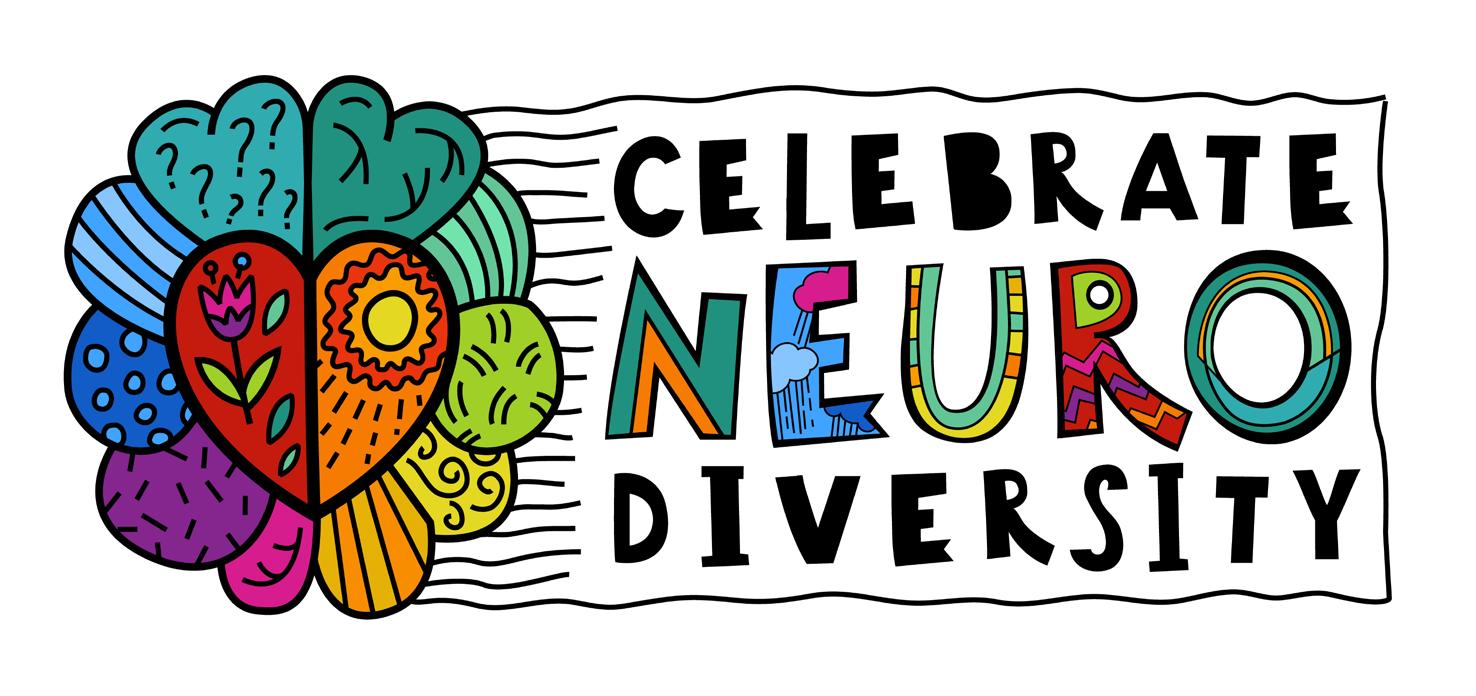
● Self awareness inventories
● Weighted tools
● Advanced notice of changes
● And more!
I think we can all relate that the world of education needs to spice it up and help our students to embrace their “neurospicy selves”.
Citations:

Baumer, N., & Frueh, J. (2021, November 23). What is neurodiversity?
Harvard Health Publishing. https:// www.health.harvard.edu/blog/ what-is-neurodiversity-202111232645

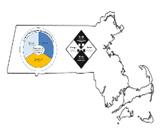
Implementing the MA Model 3.0: A Framework for Comprehensive School Counseling Programs
Helen C. O’Donnell, Ed.D helenod@att.net
MASCA MA Model Committee, 3.0 Writing Team Co-Chair, MA Model Trainer
Endorsed by both MA DESE and MA School Counselors Association's Governing Board, the MA Model 3.0: A Framework for Comprehensive School Counseling Programs is an evolving document to guide professional best practice. It was presented as a professional courtesy to the field in the spring of 2020 as a public domain resource. This ongoing Counselor’s Notebook (CN) series shares steps and strategies for implementing the MA Mode 3.0 and ASCA Model 5.0©. A library of resources and chart of past CN implementation articles are available at https://masca.wildapricot.org/MA-Model_3.0
Striving For the End Goal: A Comprehensive School Counseling Programs for
The Sept.2025 CN MA Model Implementation article celebrated 20 years of exciting steps forward citing both MASCA and DESE encouraging integration of the MA Model: A Framework for School Counseling Programs as school counseling best practice. Fifty (50+) CN MA Model articles have explained implementation strategies and shared action research results. Guided by MASCA committees, multi-tiered and diverse MASCA professional development, and ASCA resources, comprehensive school counseling programs are emerging in MA schools.
I have been reading The Tipping Point by Malcome Gladwell to gather ideas about how a new trend sparks people to embrace and imbed a new fad or initiative into practice. Gladwell researches the question, “What triggers a trend?” and concluded it ls like a “contagious behavior” and cites examples like fashion trends. His research findings conclude that spreading the word and having people realize that others are adopting and integrating successful new practice or modeling new behaviors can promote a trend. “Ideas… like behaviors, can spread like an epidemic” and people just begin copying it and doing it (p. 7-8).
ALL Student in ALL Schools
MASCA has been following the principle of progression by strategically educating school counselors about comprehensive school counseling through PD and webinar education, sharing implementation pilot initiatives, and promoting program assessment to encourage data supported annual program adjustments and modifications to meet evolving student needs. The accompanying crossword puzzle identifies common integration highlights from the Define, Assess, Manage, and Deliver components of the MA Model 3.0 document. Are you familiar with all the answers?
Now, we face the challenge is how to achieve the MA Model end goal of a comprehensive school counseling program in ALL schools for ALL students? What will spark the trend and help MASCA achieve Gladwell’s goal of reaching our “tipping point” when comprehensive school counseling programs becomes integrated practice in ALL schools for ALL students?
In 2024 MASCA’s Professional Recognition Committee created the Excellence in School Counseling Program Award (ESCPA) that recognizes MA schools offering high quality comprehensive school counseling programs. The ESCPA
honored 1 school in 2024 and two schools in 2025.
To promote the spark, MASCA is hosting an informational and exciting webinar - Strategies and best practices to implement comprehensive school counseling programs - on Wednesday, October 15 from 3:15-4:15 pm via zoom. The webinar will showcase exemplary comprehensive school counseling programs. Listen to your colleagues explain the steps and process they followed to develop their programs and qualify for ESCPA recognition. Participants will also learn about the 2026 ESCPA application process and . You must pre-register here
In addition to reviewing the 2026 ESCPA criteria and nomination process, the webinar will also allow the three previous ESCPA honorees to share their successes and challenges.
Speakers include:
Apponequet Regional High School, Lakeville (2024)
Nicole (Graf) Fairweather, Counseling Department Head Burlington High School, Burlington (2025)
Christine Conceison, M.S.W., LICSW, District Director of Mental Health
(continued next page)
MA Model
(continued from previous page)
Joe Attubato, 9-12 Counseling Director, Sgt. Robert R. Litwin Elementary School, Chicopee (2025)
Tama Lang, LICSW School Counselor
Let’s keep the trend growing!
1. Attend the webinar. (You can find details here)
2. Review the 2026 Excellence in School Counseling Program Award nomination details and rubric guidelines. Submit your program. It is FREE! If you do not meet the rubric standards, set action plan goals to strengthen areas for development, and apply again next year!
3. Do an independent or dept. program review by completing and assessing the results of the Self-Study Audit (last document in the MA Model 3.0 Appendix) to analyze your program’s level of MA Model implementation. Set goals and action plan targets to strengthen identified areas needing development.
4. Invite the MASCA Program Review team into your school to assist with program assessment and suggestions.
Need another spark?
Funded by the Ronald Fredrickson Endowment Fund for Professional Development and School Counselor Research, the Franklin Hampshire Counseling Association will award a $50 stipend to 5 ESCPA recognized programs in 2026 (random drawing, if needed).

Join Our MASCA Retirees SIG!
Anne Thidemann French annethidemannfrench@gmail.com and Helen O’Donnell helenod@att.net
All are welcome at our SIG meetings to plan for retirement, be informed about retirement issues, and share your retirement experiences. We welcome attendees to participate in discussions, ask technology and retirement questions, and suggest new topics and speakers. Whether you are retired or just dreaming of retirement we are here for you. Retiree SIG webpage
https://masca.wildapricot.org/page-18134
Nov. 20 - Issues Facing Retirees - Speaker: Marie Ardito, Retirees United Retirement Specialist 3:30-4:40 via ZOOM. Register HERE
MASCA’s 2024 Special Award Recipient, Maria Ardito, will again present her webinar on Issues Facing Retirees, for colleagues anticipating retirement. She is very informed and considered an expert. Her very detailed ppt and contact information will be posted on the Retiree SIG webpage. She welcomes your inquiries during the webinar or email questions to helenod@att.net with Retiree SIG in subject line.
CROSSWORD PUZZLE CLUES
Across
3. These documents organize programming and inform stakeholders of scheduled events.
4. Written plans that guide multi-tiered content delivery.
7. The MA Model 3.0 was endorsed by the MASCA GB and _____.
8. Counselors are encouraged to do this with their colleagues.
9. A statement that describes the function and purpose of a school counseling program.
12. School counseling curriculum content delivery document.
13. This should include topic instruction in academic/technical, workplace readiness/career, and SEL domains.
14. Instructional content reflects ______ to local, state, and national student learning benchmarks
16. Using data and your voice to encourage change.
18. One of four major components of a comprehensive school counseling program.
(Puzzle on next page)
Down
1. Established achievement targets.
2. One of four major components of a comprehensive school counseling program.
5. ASCA has written ethical and professional guides called ______.
6. Data analysis can identify student learning ___.
7. One of four major components of a comprehensive school counseling program.
10. School counseling programs should provide multi-tiered services to which students?
11. An acronym that describes a measurable achievement target.
12. One of four major components of a comprehensive school counseling program.
15. What does a council of students and/or community members do to assist a school counseling department?
17. After collecting and compiling student exit interview results, what is done next?
Comprehensive School Counseling Programs
CROSSWORD PUZZLE
(Clues on Page 15)

Puzzle created by Helen O’Donnell using Crossword Labs
MASCA Governing Board and Staff Directory
GOVERNING BOARD
Chair: Ali Robidoux
School Adjustment Counselor
New Bedford Public Schools
Assistant Chair: Cory McGann
School Counseling Department
Head
Ashland High School
Board Members
Mindy Cripps
Director of School Counseling
Billerica High School
John Crocker
Director of School Mental Health & Behavioral Services
Methuen Public Schools
Jessica Descartes
School Counselor
Tech Boston Academy
Andrea Encarnacao
School Counselor
Boston Latin School
Cynthia Esielionis
School Counselor
Ayer Shirley Regional Middle School
Lori Ford
School Counselor
Edgartown School, Martha’s Vineyard
Amanda Ugrinow
School Counselor
Westborough High School COMMITTEES
Conference
Ali Robidoux
School Adjustment Counselor
New Bedford Public Schools
Ethics
Mindy Cripps
Guidance Director
Billerican High School
Fiscal Oversight
John Crocker
Director of School Mental Health & Behavioral Services
Methuen Public Schools
Government Relations & Advocacy
Juliette Coatsworth
School Counselor
Foxborough Regional Charter School
Fran Frederick
School Adjustment Counselor
Belchertown High School
Inclusion, Diversity, Equity & Access
Vacant
MA Model
Jodi Then
School Counselor
Snowden International School, Boston
Cynthia Esielionis
School Counselor
Ayer Shirley Regional Middle School
Member Services
Tama Lang
School Counselor
Litwin Elementary School, Chicopee
Nomination and Bylaws
Jessica Descartes
School Counselor
Tech Boston Academy
Professional Recognition
Dina Sibilia
School Counselor
West Springfield High School
Tama Lang
School Counselor
Litwin Elementary School, Chicopee
Publicity
Luz Mederos Dorleans
School Counselor
Boston Latin Academy
Chris Soverow
Retired School Counselor
Research and Evaluation
Tim Poynton
Professor
UMASS Boston
School Counselor Pipeline
Jessica Almeida
School Counselor
Quinn Middle School, Hudson
Jennifer McGuire
College & Career Information
Coordinator
New Bedford Public Schools
Strategic Planning
Vacant
Technology
Jennifer McGuire
College & Career Information
Coordinator
New Bedford Public Schools
APPOINTED POSITIONS
Executive Director & Member-
ship Coordinator
Bob Bardwell
Secretary
Julia Cahill-O’Shea
Counselors Notebook & Tech Coordinator
Jean Atwater-Williams
Mentoring Coordinator
Maryanne Margiotta
Program Review Coordinator
Kari Denitzio
Diversity Fellows
Amanda Berg
ESP, Granby Elementary School
Roz Riggins-DesRuisseux
School Counselor
Snowden International School, Boston
Denise Evans
School Counselor
The Carroll School
JC Topete Martinez
School Counselor
Boston Latin School
PDP Coordinator
Ali Robidoux
School Adjustment Counselor
New Bedford Public Schools
LIAISONS
Affiliate Liaison
Christine Weissman
Family & Community Engage-
ment Counselor
Ware Jr.-Sr. High School
Counselor Educator Liaison
Megan Krell
Associate Professor
Fitchburg State University
DESE Liaison
Lisa Harney
MA Dept of Elementary & Secondary Education
Emerging Leader Liaisons
Cory McGann
School Counseling Department
Head
Ashland High School
Courtney Royal
School Counselor
Gloucester High School
Graduate Student Liaisons
Ryan Beck
Gradudate Student
UMASS Amherst
Rachel Flagg
Gradudate Student
Assumption University
Nicole Ward
Gradudate Student
Boston University
EMERGING LEADERS
Allison Brann School Counselor
Athol-Royalston Community School
Charlsey Penney
School Counselor
Challenge & Reach Academy, Worcester
Jen Pinhal
Early College School Counselor
New Bedford High School
Sara Runkle
School Counselor
Kiley Prep Middle School, Springfield
Emerging Leader
Anthony Simmons
School Counselor
Atlantis Charter School
SPECIAL INTEREST GROUP (SIG) LEADERS
Career/Technical
Annie McCarthy
School Counselor
Franklin County Technical School
Maryrose O’Neil
School Counselor
Tantasqua Regional High School
Kaitlin Monahan
School Counselor
Greater Lowell Technical High
School
Counseling Directors
Meg Clougherty
School Counseling Program
Director
Boston Latin School
Brynn Cooper
Director of Counseling
Weymouth High School
Elementary
Lori Ford
School Counselor
Martha’s Vineyard
Megan McShane School Counselor
St Columbkille Partnership School
Maura Ricardi
School Adjustment Counselor
East Street School, Ludlow
Multilingual Learners
Priscila Anderson
School Counselor
Woburn Memorial High School
Matt Baione
School Counselor
Revere High School
Olivia Hull
School Adjustment Counselor
Brookline High School
Middle Level
Dawn Martin
School Counselor
Qualters Middle School, Mansfield
Jackie Saunders
School Counselor
Gibbs School, Arlington Retirees
Helen O’Donnell
Retired School Counselor
Anne Thidemann French
Retired School Adjustment
Counselor
School Adjustment Counselors/
School Social Worker
Nychele Clark
School Adjustment Counselor
Gardner High School
Kate Niedel
Retired School Adjustment Counselor
Anne Thidemann French
Retired School Adjustment Counselor
Secondary
Karen McCrillis
School Counselor
Gardner High School
Anthony Simmons
School Counselor
Atlantis Charter School, Fall River
Rachael Weinhold
School Counselor
Winchendon High School
Urban
Rani Gould
School Counselor
The Academy at Kiley Middle School
Chase Grogan
Student Development Counselor
Community Academy of Science and Health
Sara Runkle
School Counselor
Kiley Prep Middle School, Springfield
AFFINITY GROUP LEADERS
Counselors of Color
Jessica Descartes
School Counselor
Tech Boston Academy
Andrea Encarnacao
School Counselor
Boston Latin School
Aaron Spencer
School Counselor
Nashoba Valley Technical High School
LGBTQ+
Jessica Almeida
School Counselor
Quinn Middle School, Hudson
Mindy Cripps
Director of School Counseling
Billerica High School
Denise Evans
School Counselor
The Carroll School
Mission Statement:
The mission of MASCA is to elevate and advance the school counseling profession in Massachusetts through leadership, collaboration, visibility, and professional development to optimize student success.
Vision Statement:
The vision of MASCA is to equip school counseling professionals with the knowledge and skills needed to implement a comprehensive school counseling program in their school community. Through an equitable lens, we advocate that all K-12 Massachusetts students have access to a school counselor and the opportunity to become their best selves in school, their personal lives, and their communities.
Core values:
Advocacy - Committing to center the school counseling profession by highlighting and advancing the core values of school counselors, both individually and as a profession.
Equity - Requiring inclusivity, diversity, and accessibility for all school counselors and the students and families they serve
Collaboration – Working together with all stakeholders allows school counselors to deliver the highest quality school counseling program for all students.
Excellence - Maintaining the highest level of professional standards and advancing the delivery of comprehensive school counseling programs (i.e.: MA Model) for all students.
Strategic Objectives:
Objective #1 - Advocacy - Position MASCA as a recognized, valuable, and respected voice at local, state, and regional levels by building the awareness of the importance and impact of the work and role of school counseling professionals.
Objective #2 - Equity - Position MASCA as a leading organization in dismantling racist, sexist, homophobic, gendered, ableist, ageist, religious intolerance and other oppressive policies and practices while emphasizing the need for diversity and inclusion in school counseling personnel and programming.
Objective #3 - Membership - Grow MASCA membership by retaining and engaging current members, and recruiting new members, with an on-going commitment to cultivate a more diverse membership.
Objective #4 – Professional Development - Create, provide and/or promote relevant, high-quality, accessible, and timely professional development to meet the needs of our members and support the implementation of comprehensive school counseling programs.
Objective #5 – School Counselor Pipeline - MASCA must address the increasing number of unfilled school counselor vacancies and reduction of candidates entering school counseling preparation programs.

